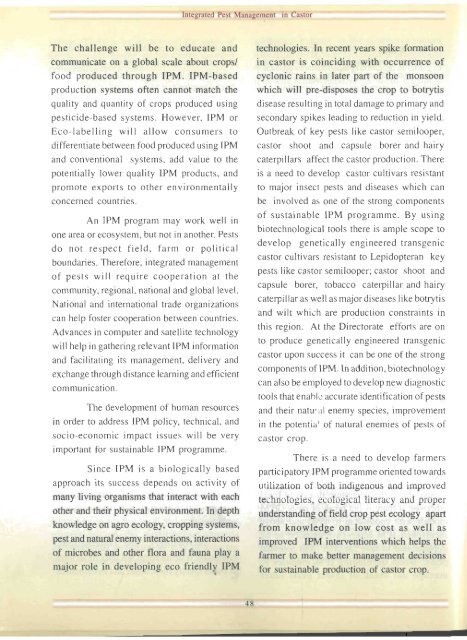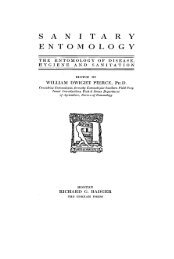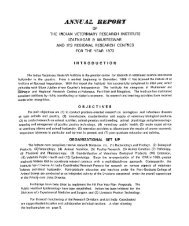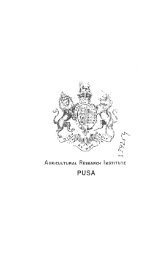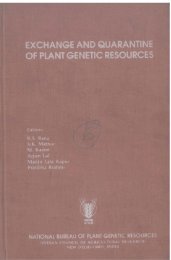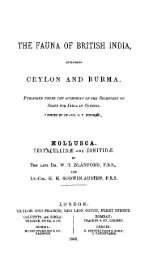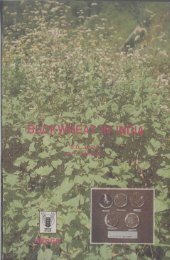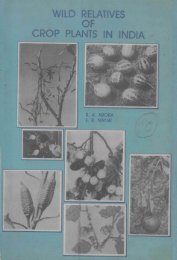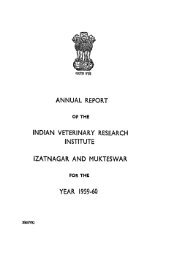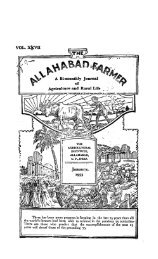Directorate of Oilseeds Research
Directorate of Oilseeds Research
Directorate of Oilseeds Research
Create successful ePaper yourself
Turn your PDF publications into a flip-book with our unique Google optimized e-Paper software.
Integrated Pest Management in Castor<br />
The challenge will be to educate and<br />
communicate on a global scale about crops!<br />
food produced through IPM. IPM-based<br />
production systems <strong>of</strong>ten cannot match the<br />
quality and quantity <strong>of</strong> crops produced using<br />
pesticide-based systems. However, IPM or<br />
Eco-Iabelling will alJow consumers to<br />
differentiate between food produced using IPM<br />
and conventional systems, add value to the<br />
potentiaJly lower quality IPM products, and<br />
promote exports to other environmentally<br />
concerned countries.<br />
An IPM program may work well in<br />
one area or ecosystem, but not in another. Pests<br />
do not respect field, farm or political<br />
boundaries. Therefore, integrated management<br />
<strong>of</strong> pests will require cooperation at the<br />
community, regional, national and global level.<br />
National and international trade organizations<br />
can help foster cooperation between countries.<br />
Advances in computer and satellite technology<br />
will help in gathering relevant lPM information<br />
and facilitating its management, delivery and<br />
exchange through distance learning and efficient<br />
communication.<br />
The development <strong>of</strong> human resources<br />
in order to address IPM policy, technical, and<br />
socio-economic impact issues will be very<br />
important for sustainable IPM programme.<br />
Since IPM is a biologically based<br />
approach its success depends on activity <strong>of</strong><br />
many living organisms that interact with each<br />
other and their physical environment. In depth<br />
knowledge on agro ecology, cropping systems,<br />
pest and natural enemy interactions, interactions<br />
<strong>of</strong> microbes and other flora and fauna playa<br />
major role in developing eco friendly rPM<br />
technologies. In recent years spike formation<br />
in castor is coinciding with occurrence <strong>of</strong><br />
cyclonic rains in later part <strong>of</strong> the monsoon<br />
which will pre-disposes the crop to botrytis<br />
disease resulting in total damage to primary and<br />
secondary spikes leading to reduction in yield.<br />
Outbreak <strong>of</strong> key pests like castor semilooper,<br />
castor shoot and capsule borer and hairy<br />
caterpillars affect the castor production. There<br />
is a need to develop castor cultivars resistant<br />
to major insect pests and diseases which can<br />
be involved as one <strong>of</strong> the strong components<br />
<strong>of</strong> sustainable rPM programme. By using<br />
biotechnological tools there is ample scope to<br />
develop genetically engineered transgenic<br />
castor cultivars resistant to Lepidopteran key<br />
pests like castor semi looper; castor shoot and<br />
capsule borer, tobacco caterpillar and hairy<br />
caterpillar as well as major diseases like botrytis<br />
and wilt whi...:h are pr~duction constraints in<br />
this region. At the <strong>Directorate</strong> efforts are on<br />
to produce genetically engineered transgenic<br />
castor upon success it can be one <strong>of</strong> the strong<br />
components <strong>of</strong>lPM. In addition, biotechnology<br />
can also be employed to develop new diagnostic<br />
tools that enahk accurate identification <strong>of</strong> pests<br />
and their natu' al enemy species, improvement<br />
in the potentia' <strong>of</strong> natural enemies <strong>of</strong> pests <strong>of</strong><br />
castor crop.<br />
There is a need to develop farmers<br />
participatory JPM programme oriented towards<br />
utilization <strong>of</strong> both indigenous and improved<br />
technologies, ecological literacy and proper<br />
understanding <strong>of</strong> field crop pest ecology apart<br />
from knowledge on low cost as well as<br />
improved IPM interventions which helps the<br />
farmer to make better management decisions<br />
for sustainable production <strong>of</strong> castor crop.<br />
48


